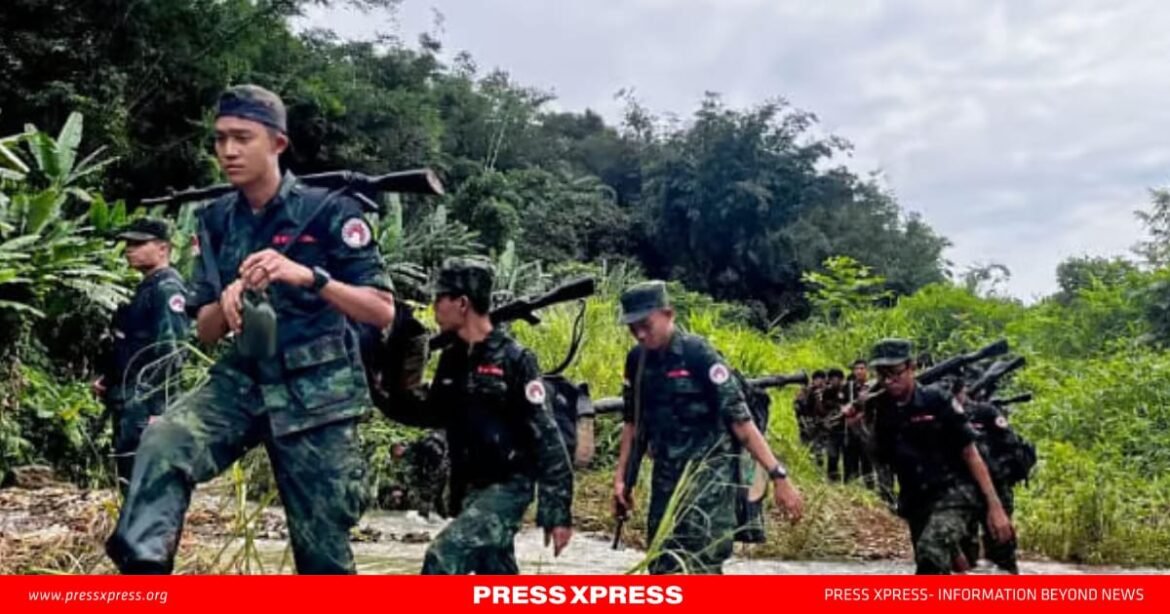Key Highlights
- Territorial Gains: The Arakan Army now controls approximately 60% of Rakhine State, including the entire 271-kilometer border with Bangladesh
- Geopolitical Significance: The AA’s rise has heightened tensions with neighboring countries and drawn the attention of global powers like China and the United States
- Ethnic and Humanitarian Complexities: The AA’s fraught relationship with the Rohingya community, coupled with Myanmar’s broader ethnic conflicts

Photo: Arakan Army
The Arakan Army (AA) has emerged as a pivotal force in Myanmar’s ongoing civil conflict, establishing itself as a formidable entity with significant territorial control and strategic influence that commands both regional and global attention. Rooted in the tumultuous aftermath of Myanmar’s 2021 military coup, the AA’s ascent reflects a broader narrative of ethnic resistance and the quest for autonomy among Myanmar’s marginalized communities. The group’s ability to capitalize on the political instability and weakened central authority highlights the deeply entrenched ethnic grievances and the broader failure of the state to address historical inequities.
The AA’s rise is not merely a domestic concern but a regional issue with far-reaching implications. Its operations and territorial ambitions have heightened tensions in Rakhine State, a region already marred by decades of ethnic conflict and humanitarian crises, including the Rohingya exodus. The group’s strategic maneuvers have complicated the dynamics of regional stability, particularly for neighboring Bangladesh, which grapples with its own challenges stemming from the influx of refugees and border security concerns. Moreover, the AA’s activities have attracted the attention of global powers, as the group operates within the intersection of Myanmar’s internal conflict, China’s strategic interests, and broader international concerns over human rights and regional peace.

Figure: Press Xpress
A Rising Power in Rakhine State
The Arakan Army serves as the military arm of the United League of Arakan (ULA), representing the Buddhist Rakhine people. Its stated aim is to establish an autonomous or confederate region in Rakhine state, where ethnic and religious tensions have simmered for decades. The AA has capitalized on the Myanmar military’s weakened position, capturing townships, military outposts, and even key regional command centers such as the Western Command headquarters in Ann. These advances underscore the group’s growing military prowess and its capacity to challenge the junta’s control.
A Double-Edged Alliance with the Rohingya
The AA’s relationship with the Rohingya Muslim minority presents a critical challenge. While the AA claims to include the Rohingya in its vision of an autonomous Rakhine, historical animosities and reported attacks against the Rohingya by AA forces complicate this narrative. The AA’s leadership acknowledges the need to address these tensions constructively to ensure long-term stability. However, the recruitment of Rohingyas by both the AA and the Myanmar military adds layers of complexity, further exacerbating mistrust and instability in the region.
Strategic and Geopolitical Implications
The AA’s territorial control now extends to the 271-kilometer border with Bangladesh, marking a significant shift in regional power dynamics. This development has heightened concerns in Dhaka, where the government struggles to manage the influx of over 1.2 million Rohingya refugees. Corruption at the border, coupled with the risk of increased trafficking in drugs, arms, and humans, poses an escalating security threat to Bangladesh.
Neighboring countries like Bangladesh and India must grapple with the AA’s rise, balancing their national security interests with the need for regional stability. While Bangladesh has refrained from engaging with the AA, experts suggest that informal relations may eventually become unavoidable to address cross-border security issues.
The Role of China and Other Global Players
China’s strategic interests in Rakhine state, particularly through its Belt and Road Initiative (BRI), place it in a pivotal position to influence the conflict’s trajectory. The Kyaukphyu deep-sea port and its associated oil and gas pipelines are critical components of the China-Myanmar Economic Corridor. Any instability in Rakhine jeopardizes these investments, compelling Beijing to broker ceasefires and maintain dialogue with key actors, including the AA’s allies.
Meanwhile, the United States continues to monitor the situation closely, emphasizing the conflict’s potential to destabilize the region further. Washington has lauded Bangladesh’s role in hosting Rohingya refugees but also underscores the need for a sustainable resolution to the crisis, which hinges on addressing the root causes of ethnic violence in Myanmar.
Bangladesh’s Predicament
For Bangladesh, the AA’s growing power poses both immediate and long-term challenges. The complete control of the Myanmar-Bangladesh border by a non-state actor complicates efforts to ensure security and manage refugee flows. Moreover, the stalled Rohingya repatriation process has left Bangladesh grappling with economic, social, and environmental burdens.
To mitigate these risks, Bangladesh must adopt a multifaceted approach. This includes securing its borders against illicit activities, engaging diplomatically with Myanmar’s military and civilian factions, and leveraging international support to pressure for a peaceful resolution. The government’s vigilance will be critical to preventing further destabilization while addressing humanitarian concerns.
Conclusion
The AA’s course underscores the fragility of Myanmar’s political landscape and the broader implications for regional stability. As the group consolidates its hold over Rakhine, questions about its ultimate goals remain unresolved. Whether the AA pursues full independence, confederation, or integration within a restructured Myanmar will largely depend on the evolving dynamics between ethnic groups, the junta, and international stakeholders.
Indeed, understanding the multifaceted dynamics surrounding the AA is crucial not only for addressing Myanmar’s protracted civil war but also for anticipating its ripple effects on regional geopolitics, humanitarian challenges, and the evolving security landscape in South and Southeast Asia. This necessitates a comprehensive analysis of the AA’s origins, motivations, and strategies, as well as its impact on Myanmar’s neighboring states, particularly in terms of cross-border implications for Bangladesh and the broader Bay of Bengal region and on the same line to mention that to achieve a lasting resolution, all parties must address key issues such as ethnic reconciliation, equitable resource distribution, and the protection of minority rights..


